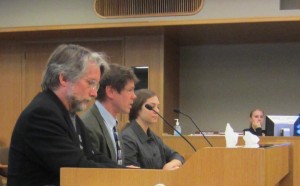 On May 21st, 2013 State Rep. Brad Witt held an informal hearing on the Trans-Pacific Partnership in the House Agriculture and Natural Resources Committee that he chairs.
On May 21st, 2013 State Rep. Brad Witt held an informal hearing on the Trans-Pacific Partnership in the House Agriculture and Natural Resources Committee that he chairs.
This hearing could not have been more timely as thousands across the globe gathered to protest Monsanto’s GMOs. Monsanto is one of the 600 corporations pushing for the TPP; they want to use this free trade agreement as a tool to force genetically modified seeds and foods onto countries regardless of existing laws and regulations.
The Committee heard testimony on the TPP’s impact on food safety standards that affect not only whether Oregon consumers will have to eat products that don’t meet our domestic safety standards, but also whether Oregon producers will have to compete with overseas fish farms, industrial fruit and vegetable operations and others that aren’t bound by the same standards as they are.
They also heard how the TPP is likely to cover consumer labeling, potentially handcuffing both the state and federal government’s ability to require labels on things like genetically-engineered salmon on the one hand, and country-of-origin labels, on the other.
The Government Procurement Chapter could restrict “buy local” food purchasing programs in schools, prisons and other public institutions.
Mark MacPherson – Teamsters’ Joint Council 37, spoke about how the TPP would adversely affect the dairy industry in North America, including the 600 IBT member dairy workers employed at eight different dairy facilities in Oregon. He said “We are concerned about sanitary standards and market access – in short, concerned that the agreement will be unhealthy and will kill U.S. jobs in the dairy industry. Many of us may not know much about New Zealand, which is one of the twelve countries in negotiations, but it is my understanding that New Zealand is to milk what Saudi Arabia is to oil. New Zealand has a monopolistic dairy sector wherein essentially one company, Fonterra, has evolved only several degrees from a state-owned entity. New U.S. market access for New Zealand would be especially damaging not only to Teamsters, but to Oregon dairy farmers as well.”
Rhett Lawrence – OR Sierra Club testified on the issue of illegal logging in the Pacific Rim, which would not only contribute to deforestation and the climate crisis, but would also put Oregon companies that want to practice sustainable logging at a huge economic disadvantage which likely means the loss of jobs. Rhett says ” We cannot permit the TPP to go through without provisions addressing illegal logging”
Mike Sullivan from the Association of Pulp and Paper Workers, Bill Kluting from the Carpenters Industrial Council and Tom Chamberlain laid out the devastating cost of free trade agreements, with 20 years of trade related job losses from NAFTA style trade deals.
And as Committee Chair Rep. Brad Witt pointed out there is an utter lack of transparency in TPP negotiations, “All negotiations are secret and the public, which is to say, “We the People,” (in whose interest presumably this international trade deal is being negotiated), cannot observe the negotiations or review the matters being discussed.”
And one final quote that sums it up nicely, “If your not at the table, your going to be served as lunch.” Benjamin Gerritiz from Positive Force NW at the PDX Peoples’ Assembly on the TPP
You can find photos of this informational hearing on our Facebook page here.
See what we’re posting on:
Upcoming Events
Oregon Fair Trade Campaign invites folks in Portland to the Global Justice Committee meeting — a committee of Portland Jobs with Justice. At this meeting, trade-agreement politics will be a focus, so, take up working with us on this plus global solidarity broadly.
Details:
Wed., October 23rd, from 8 to 9 pm at 1500 NE Irving Street, 5th floor
NOTE: This is typically a monthly meeting on fourth Wednesdays.
